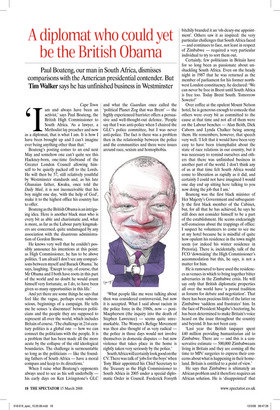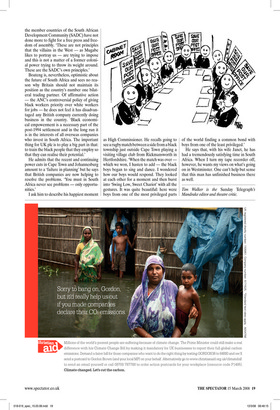A diplomat who could yet be the British Obama
Paul Boateng, our man in South Africa, dismisses comparisons with the American presidential contender. But Tim Walker says he has unfinished business in Westminster Cape Town Iam and always have been an activist,’ says Paul Boateng, the British High Commissioner to South Africa. ‘As a lawyer, a Methodist lay preacher and now as a diplomat, that is what I am. It is how I have been brought up and I can’t imagine ever being anything other than that.’ Boateng’s posting comes to an end next May and somehow one can’t quite see this Hackney-born, one-time firebrand of the Greater London Council allowing himself to be quietly packed off to the Lords. He will then be 57, still relatively youthful by Westminster standards and, as his late Ghanaian father, Kwaku, once told the Daily Mail, it is not inconceivable that his boy might one day, ‘with the help of God’, make it to the highest office his country has to offer.
Boateng as the British Obama is an intriguing idea. Here is another black man who is every bit as able and charismatic and, what is more, as far as the Labour party kingmakers are concerned, quite undamaged by any association with the disastrous administration of Gordon Brown.
He knows very well that he couldn’t possibly announce his intentions at this point: as High Commissioner, he has to be above politics. ‘I am afraid I don’t see any comparisons between myself and Barack Obama,’ he says, laughing. ‘Except to say, of course, that Mr Obama and I both have roots in this part of the world and no doubt he would count himself very fortunate, as I do, to have been given so many opportunities in this life.’ And yet there are some things he says that feel like the vague, perhaps even subconscious, beginnings of a campaign. He tells me he senses ‘a disconnect’ between politicians and the people they are supposed to represent all over the world, which includes Britain of course. ‘The challenge in 21st-century politics is a global one — how we can connect the politicians with the people. It is a problem that has been made all the more acute by the collapse of the old ideological boundaries. The challenge is surmountable so long as the politicians — like the founding fathers of South Africa — have a moral compass and keep to its directions.’ When I raise what Boateng’s opponents always used to see as his soft underbelly — his early days on Ken Livingstone’s GLC and what the Guardian once called the ‘political Planet Zog that was Brent’ — the highly experienced barrister offers a persuasive and well-thought-out defence. ‘People say that I was anti-police when I chaired the GLC’s police committee, but I was never anti-police. The fact is there was a problem then in the relationship between the police and the communities and there were issues around race, sexism and homophobia.
‘What people like me were talking about then was considered controversial, but now it is accepted. What I said about racism in the police force in the 1980s, now — postMacpherson (the inquiry into the death of Stephen Lawrence) — seems quite unremarkable. The Women’s Refuge Movement was then also thought of as very radical — the police in those days would not involve themselves in domestic disputes — but now violence that takes place in the home is rightly taken very seriously by the police.’ South Africa will certainly look good on the CV. There was talk of ‘jobs for the boys’ when Tony Blair appointed his Chief Secretary to the Treasury as the High Commissioner to South Africa in 2005 under a special diplomatic Order in Council. Frederick Forsyth bitchily branded it an ‘oh-deary-me appointment’. Others saw it as inspired: the very particular challenges that South Africa faced — and continues to face, not least in respect of Zimbabwe — required a very particular individual to try to sort them out.
Certainly, few politicians in Britain have for so long been as passionate about unshackling South Africa. Even on the heady night in 1987 that he was returned as the member of parliament for his former northwest London constituency, he declared: ‘We can never be free in Brent until South Africa is free too. Today Brent South. Tomorrow Soweto!’ Over coffee at the opulent Mount Nelson hotel, he is generous enough to concede that others were every bit as committed to the cause at that time and not all of them were on the Labour benches — Alan Beith, Dick Caborn and Lynda Chalker being among them. He remembers, however, that speech very well. ‘I felt that it would have been very easy to have been triumphalist about the state of race relations in our country, but it was necessary to remind ourselves and others that there was unfinished business in another part of the world. I don’t think any of us at that time felt South Africa would come to liberation as rapidly as it did, and certainly I could not have imagined I would one day end up sitting here talking to you now doing the job that I am.’ Boateng was the first black minister of Her Majesty’s Government and subsequently the first black member of the Cabinet, but, for all that he has achieved, he says he still does not consider himself to be a part of the establishment. He seems endearingly self-conscious about the trappings of office: I suspect he volunteers to come to see me at my hotel because he is mindful of quite how opulent his residence in the town might seem (or indeed his winter residence in Pretoria). There is, incidentally, talk of the FCO ‘downsizing’ the High Commissioner’s accommodation but this, he says, is not a matter for him.
He is rumoured to have used the residences as venues in which to bring together bitter adversaries in the Zimbabwe crisis. He will say only that British diplomatic properties all over the world have ‘a proud tradition as forums for debate and negotiation’. That there has been precious little of the latter on Zimbabwe ‘saddens and frustrates’ him. In the face of President Mugabe’s hectoring, he has been determined to make Britain’s voice heard on the issue throughout the country and beyond. It has not been easy.
‘Last year the British taxpayer spent £40 million providing humanitarian aid to Zimbabwe. There are — and this is a conservative estimate — 500,000 Zimbabweans living in Britain and they are coming all the time to MPs’ surgeries to express their concerns about what is happening in their homeland. Britain is entitled to a point of view.’ He says that Zimbabwe is ultimately an African problem and it therefore requires an African solution. He is ‘disappointed’ that the member countries of the South African Development Community (SADC) have not done more to fight for a free press and freedom of assembly. ‘These are not principles that the villains in the West — as Mugabe likes to portray us — are trying to impose and this is not a matter of a former colonial power trying to throw its weight around. These are the SADC’s own principles.’ Boateng is, nevertheless, optimistic about the future of South Africa and sees no reason why Britain should not maintain its position as the country’s number one bilateral trading partner. Of affirmative action — the ANC’s controversial policy of giving black workers priority over white workers for jobs — he does not feel it has disadvantaged any British company currently doing business in the country. ‘Black economical empowerment is a necessary part of the post-1994 settlement and in the long run it is in the interests of all overseas companies who invest in South Africa. The important thing for UK plc is to play a big part in that: to train the black people that they employ so that they can realise their potential.’ He admits that the recent and continuing power cuts in Cape Town and Johannesburg amount to a ‘failure in planning’ but he says that British companies are now helping to resolve the problems. ‘You must in South Africa never see problems — only opportunities.’ I ask him to describe his happiest moment as High Commissioner. He recalls going to see a rugby match between a side from a black township just outside Cape Town playing a visiting village club from Rickmansworth in Hertfordshire. ‘When the match was over — which we won, I hasten to add — the black boys began to sing and dance. I wondered how our boys would respond. They looked at each other for a moment and then burst into ‘Swing Low, Sweet Chariot’ with all the gestures. It was quite beautiful: here were boys from one of the most privileged parts of the world finding a common bond with boys from one of the least privileged.’ He says that, with his wife Janet, he has had a tremendously satisfying time in South Africa. When I turn my tape recorder off, however, he wants my views on what’s going on in Westminster. One can’t help but sense that this man has unfinished business there as well.



























































































 Previous page
Previous page